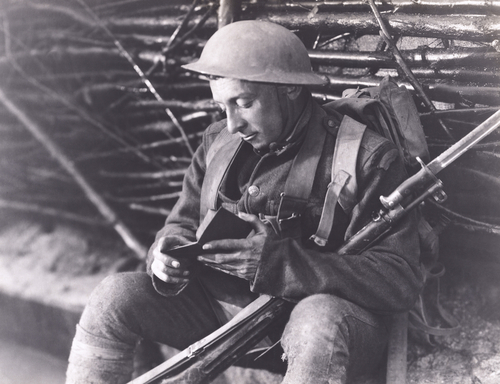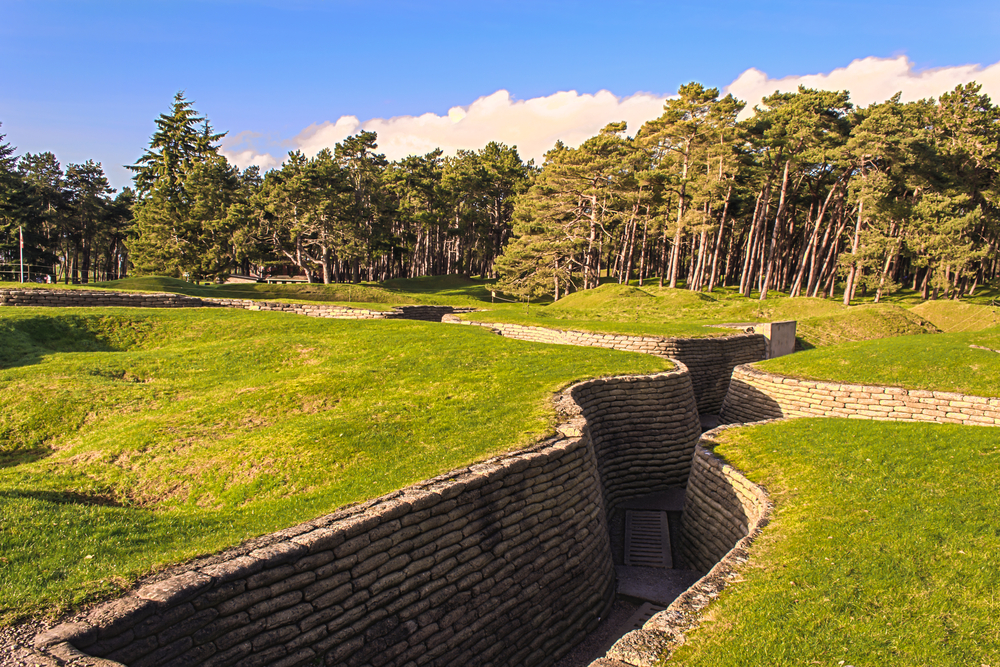As the train crammed with soldiers crept its way past Amiens toward the front, Private Stephen Graham surveyed the scene from the corner of the car he was riding in and found himself thinking of Shakespeare, or, more precisely, “a-thinking of many such occasions in life when I have parted for the unknown, listening to the soldiers’ tales, it recalled the mood of Clarence’s dream, when he was pacing on the hatches of the ship at night with the Duke of Gloucester, talking of the Wars of the Roses.” (1)
Writing about ferocious shelling at Passchendaele, Second Lieutenant Edmund Blunden said, “My indebtedness to an eighteenth-century poet became enormous. At every spare moment I read in [Edward] Young’s Night Thoughts on Life, Death and Immortality.” (2) Two thousand kilometers away in the Aegean Sea, Lieutenant Commander Patrick Shaw Stewart wrote a poem that asks the ancient hero “Was it so hard, Achilles, / So very hard to die?”
 These three soldiers differed in class, rank, education and literary interests and ambition. But as Paul Fussell shows in his excellent book The Great War and Modern Memory, they, along with tens of thousands of fellow British soldiers from all walks of life, shared the sense that literature played an important role in how they thought and wrote about the war. The extent to which literature and literariness were woven into daily life was remarkable. This, Fussell reminds us, was true not only of major poets such as Siegfried Sassoon and Wilfred Owen; it was also true of the anonymous writer who in the soldiers newspaper the Wipers Times quoted from Alexander Pope’s poem Eloise to Abelard as he described a brief respite in the form of a cricket match. (3)
These three soldiers differed in class, rank, education and literary interests and ambition. But as Paul Fussell shows in his excellent book The Great War and Modern Memory, they, along with tens of thousands of fellow British soldiers from all walks of life, shared the sense that literature played an important role in how they thought and wrote about the war. The extent to which literature and literariness were woven into daily life was remarkable. This, Fussell reminds us, was true not only of major poets such as Siegfried Sassoon and Wilfred Owen; it was also true of the anonymous writer who in the soldiers newspaper the Wipers Times quoted from Alexander Pope’s poem Eloise to Abelard as he described a brief respite in the form of a cricket match. (3)
Rich and deep as it was, this shared literary heritage was not always adequate to describe what soldiers and civilians saw, did and felt. These poets stood at a tipping point of history and were part of events that affect our geopolitical world even today. As Fussell points out, they were also at a literary tipping point, with Romantic, Victorian, and Georgian prose and poetry (not quite) behind them, but with the new poetic language of T.S. Eliot, Ezra Pound, James Joyce, and others largely still to come. Poets such as Sassoon and Owen experimented with poetic forms, language, and conventions because these poets needed a new way, a 20th-century way, to describe a 20th-century war. What would such poetry say? How would it sound? How did it convey the experience of war?
 On our Classical Pursuits trip we’ll go straight to the heart of these questions. To help take us there will be Andrew Spooner, who has been doing field research and leading battlefield poetry tours for nearly three decades. With Andrew we’ll learn about military strategy along the northern edge of the Western Front, and about life in the trenches and behind the front lines. Our focus will be on the fields, trenches, dugouts, and shelters where some of the war’s best-known writers lived, fought, and wrote their poems. We’ll also visit important sites such as Vimy Ridge and the Zonnebeke museum.
On our Classical Pursuits trip we’ll go straight to the heart of these questions. To help take us there will be Andrew Spooner, who has been doing field research and leading battlefield poetry tours for nearly three decades. With Andrew we’ll learn about military strategy along the northern edge of the Western Front, and about life in the trenches and behind the front lines. Our focus will be on the fields, trenches, dugouts, and shelters where some of the war’s best-known writers lived, fought, and wrote their poems. We’ll also visit important sites such as Vimy Ridge and the Zonnebeke museum.
In discussions, we’ll reflect on our experiences in the field and look at select poems in-depth. We’ll examine the shift of ideas from a world where many believed that humankind was on a path of steady progression to a world where many, but not all, came to regard these beliefs as shattered and false.
I was in northern France and western Belgium in June to work on our itinerary and meet with Andrew, and I am very excited to return to the region with you in 2016. This gently rolling landscape still bears the scars of what happened 100 years ago. But it is also a region full of beauty—full and lush in summer, and with distinctive architecture. I hope that you will join me on what promises to be a truly unique Travel Pursuit.
À bientôt,
Melanie
1. Quoted in Paul Fussell, The Great War and Modern Memory (New York: Oxford University Press, 1975), p. 155
2. Ibid., p. 162
3. Ibid., p. 156


